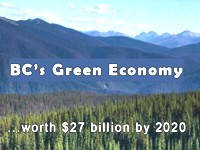BC's Green Economy Projected to Boom
 Vancouver, BC - The green
Vancouver, BC - The greeneconomy in British Columbia could be worth over $27 billion by
2020, according to an independent study by the GLOBE Foundation of
Canada.
The Vancouver-based GLOBE Foundation report, released today,
assesses the economic and employment impacts associated with the
transformation of the provincial economy towards lower-carbon
energy generation and usage, as well as business practices that
reduce greenhouse gas emissions.
“British Columbia’s Green Economy: Building a Strong Low-Carbon
Future” stresses that BC’s abundant natural resources, clean energy
choices, and advanced research and educational strengths, coupled
with its strategic location as Canada’s Pacific Gateway, positions
the province to realize significant economic and employment gains
from the pursuit of low-carbon business opportunities.
“There is great potential for BC to be at the forefront of the
emerging green economy by taking advantage of our existing assets
such as our renewable energy resources and our diverse work force,”
says John Wiebe, President and CEO of the GLOBE Foundation. “This
report demonstrates a promising future for BC’s low-carbon sectors,
even using conservative growth estimates. By aligning investment
and policy initiatives with BC’s core low-carbon sectors, there is
a good potential for green GDP and job figures to grow higher
still.”
_274x326.jpg)
The
report identifies six key sectors that form the core of the
province’s green economy and measures their impacts on Gross
Domestic Product (GDP) and employment. The six sectors are: Clean
and Alternative Energy; Energy Management and Efficiency; Green
Building; Environmental Protection; Carbon Finance and Investment;
and Green Knowledge, which includes all of the major education,
research, and training entities in the province.
Drawing on original research undertaken by the GLOBE Foundation,
as well as research from governmental and other agencies, the study
determined that BC’s six green sectors in 2008 contributed $18.3
billion in revenues to the BC economy, accounting for nearly
166,000 direct and indirect full-time equivalent jobs (equal to 7.2
per cent of total provincial employment) and $15.3 billion to
provincial GDP (equal to 10.2 per cent of total provincial
GDP).
The Clean and Alternative Energy and Energy Management and
Efficiency sectors alone were responsible for $6.1 billion in
direct GDP in 2008 - more than half (55 per cent) of the total
direct green GDP in the province. The greatest opportunities for
immediate growth are predicted in the Energy Management and
Efficiency and Green Building sectors, both of which are closely
tied to conservation strategies and the implementation of clean
technologies.
The GLOBE research team examined various growth scenarios and
determined that GDP growth by 2020 could range from between $21.0
billion at a conservative average annual growth rate (AAGR) of 2.7
per cent, and $27.3 billion at an achievable and more optimistic
AAGR of 5.0 per cent.
Choosing to use a more conservative growth estimate for
employment figures due to a predicted shortage in the supply of
labour, the GLOBE report suggests that the number of direct and
indirect full-time equivalent green jobs in the province could grow
to over 225,000 by 2020 (at a 2.6 per cent AAGR).
The report however notes that these job numbers could be
increased through the “greening” of traditional careers, increased
education and training programs for green trades, and by easing
labour supply constraints for key occupations like engineers
through immigration, for example.
_282x316.jpg)
Although close to 90 per cent of green jobs and GDP currently
are generated in the province’s southern development regions
(including the Mainland/Southwest, Vancouver Island/Coast, and
Thompson-Okanagan), the report identifies considerable potential
for green job growth in other regions of the province, in
particular, opportunities flowing from the adoption of renewable
energy and green practices in the more northern and remote
communities throughout the province.
About the Study
Funded in part by the BC Labour Market Partnerships program, the
report is the culmination of Phase 1 of a three-phase project that
aims to identify core components of the province’s green economy
and estimate potential economic opportunities associated with the
worldwide trend of “going green”.
The report also highlights several BC-based companies in each of
the six key green sectors, touching on their innovative
technologies and often visionary business practices that are at the
core of their domestic or international market success. These
companies include Day4 Energy, Nexterra Systems, Westport
Innovations, Tantalus Systems, Pulse Energy, Hemmera, Offsetters,
plus many others that are at the forefront of change in terms of
the low-carbon future.
Research for Phase 2 of the project is currently underway, which
focuses on key policies, programs, and educational initiatives that
are contributing to the development of BC’s green economy and the
associated labour market opportunities. Completion of Phase 2
is scheduled for the end of May 2010.
About GLOBE
The GLOBE Foundation of Canada is a Vancouver-based,
not-for-profit organization dedicated to finding practical
business-oriented solutions to the world’s environmental problems.
Formed in 1993, the GLOBE Foundation has helped companies and
individuals realize the value of economically viable environmental
business opportunities through its conferences and events, research
and consulting, project management, communications and awards
program.
target=”_blank”>A Backgrounder and the Press Release on the Report
are available here
You can return to the main Market News page, or press the Back button on your browser.

